




The 2023-24 academic year for the office of Diversity and Inclusion began with the addition of a new Associate Vice President of Diversity and Inclusion, Dr. Danyelle Gregory. This was the result of recommendations from the Racial Justice Advisory Committee. In addition, we hosted our 8th Multicultural Meet and Greet in the new Student Center welcoming 200+ first-year undergraduate, graduate and international students to our campus. We saw an increase in alumni participation with alumni from the Onyx Society participating in the Celebration of Excellence ceremonies and ODI staff participating in alumni meetings to identify opportunities for collaborations.
Two of our leadership team members received awards recognizing their leadership. Jayne Fraley-Burgett, Director of Disability Services received the Louise Shumaker Award from MI-AHEAD. Dr. Candy McCorkle received the 2024 Distinguished Woman in Higher Education Leadership Award from MI-ACE.
As part of the MLK Celebration, Dr. Ilyasah Shabazz, 3rd daughter of martyred civil rights leader Malcolm X and Betty Shabazz, provided our keynote. Ovi Vasquez, renowned Hispanic motivation speaker engaged with our students as part of Hispanic Heritage month.
ODI collaborated with Kalamazoo College, Kalamazoo Valley Community College and WMU-Med to host the third annual Health Equity Summit. This year we have intentionally increased our impact on the campus and the greater Kalamazoo community with the goal of ensuring inclusive, diverse and equitable spaces for all.

Dr. Candy McCorkle
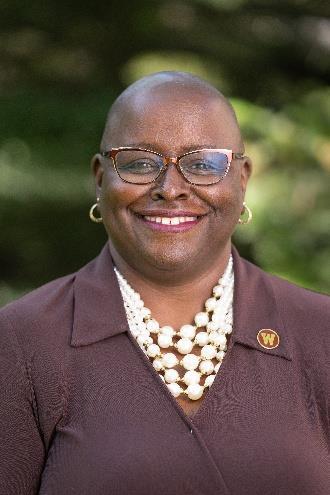
Dr. Candy McCorkle Vice President of Diversity and Inclusion

The Office of Diversity and Inclusion (ODI) supports the recruitment, retention, and persistence of our diverse student population.
Mission
ODI provides leadership and accountability in guiding systemic change in order to be equitable in access, resources, and opportunities for all in the WMU community.
Vision
To foster an equitable and inclusive campus climate that encourages and empowers all members of the institution to embrace their unique experiences and express their authentic selves.
Values
• Inclusion
• Self-empowerment
• Collaboration and relationship building
• Authenticity and uniqueness
Goals & Metrics
• To improve communication
• To increase visibility of ODI
• To develop impactful collaborations within local and campus community

In the Summer of 2020, WMU President Edward Montgomery charged Dr. Candy McCorkle, the Vice President of Diversity Inclusion, to lead the Racial Justice Advisory Committee (RJAC). RJAC was convened in fall 2020 with more than 50 members, representing every Vice Presidential area, faculty, staff, students, and alumni. RJAC provided the university with 11 recommendations focused on how to begin to deconstruct systemic inequities on our campus. As of to date we have implemented five of those recommendations.
In 2023-24 an equity audit of the university policies and police administrative policies was completed by Compass Consulting Services, LLC. The report provided recommendations on how to address inequities found in some policies, provided a framework for the university to use in the process of writing new policies, as well as revising policies.
The faculty in the Teaching, Learning and Educational Studies department have chosen to champion the recommendation to create a mentoring program. Dr. Dini Metro-Roland is leading this effort and will pilot a faculty/student mentoring program fall 2025.
The recommendation on recruiting and retaining faculty of color has been championed by Associate Provost for Equity Initiatives, Dr. Cristobal Rodriguez. Drs. Candy McCorkle, Cristobal Rodriguez and Warren Hills are working on a guideline for hiring diverse faculty and staff.
The recommendation for a staff advocate began fall 2023 with Dr. Danyelle Gregory, AVP of Diversity and Inclusion, hosting listening sessions with faculty and staff to gain insight on how staff might use this resource. Dr. Gregory will launch the resource in spring 2025. The recommendation to hire an Associate Vice President of Diversity and Inclusion was met by the hiring of Dr. Danyelle Gregory in August 2023.

The champion for the recommendation for developing a centralized Diversity Equity Inclusion (DEI) training space is Dr. Candy McCorkle. This work began in the spring of 2023 by convening a meeting with the various areas providing DEI training on campus. The hope is to create a centralized repository for campus to be able to find and understand the various types of trainings offered and to reduce redundancy.
Although we still have recommendations that need to be implemented, ODI continues to seek champions to move these recommendations forward.
The purpose of the WMU Committee is to advise the various Diversity Committees on implementing strategies and setting strategic goals to increase diversity and inclusion within their respective areas and to assist the VP of Diversity and Inclusion to set institutional DEI initiatives.
In 2023-24 the University Diversity Committee set out to examine and determine how it could be more effective in progressing the goal of become an inclusive and equitable institution committed to ensuring a sense of belonging for all. The committee elected a chair and co-chair to lead the committee. The committee reviewed the structures and functions of the diversity committees of other universities. Input was also sought by the academic deans.
So, as we begin 2024-25 the committee will continue its restructuring lead by its chair, Amanda Jeppesen and co-chair, Lisah Crall.

As part of Western Michigan University's long-term strategic diversity plan, we are committed to creating a welcoming and secure campus community. In spring 2024, students and employees were invited to participate in the third campus climate study to evaluate their experiences of diversity and inclusion on campus. Having our campus community complete this survey gave us insight into how we were doing and the improvements that needed to be made.
The Campus Climate Survey report will be made available the week of September 30, 2024. This report had less than a 10% response rate so we were unable to provide information by college or Vice Presidential area but the information is beneficial to understanding how some populations on campus are experiencing feeling welcomed, a sense of belonging and how we demonstrate inclusion and equity. The next survey will take place fall 2026.
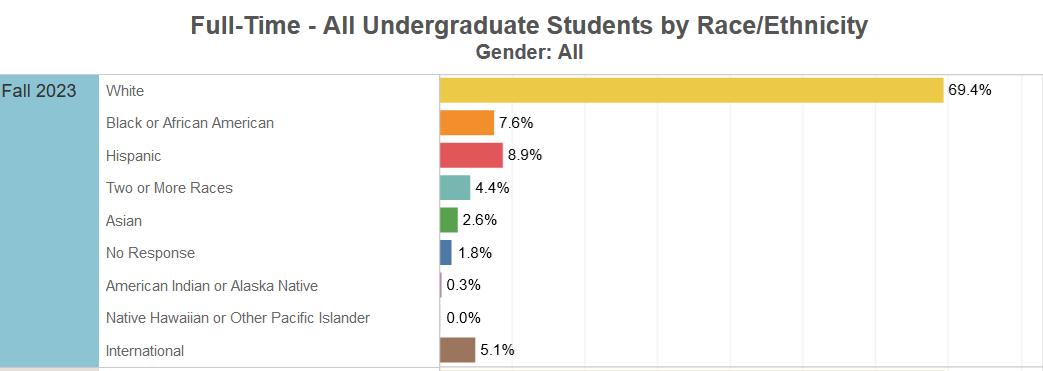

The Excellence in Diversity Awards are a means of recognizing those in our campus community who have demonstrated a commitment to ensuring that WMU is an inclusive and equitable campus. Recipients of this award have shown innovative and passionate ways in which to ensure physical, academic, and social accessibility to our campus.
In 2023-24 we awarded three awards to members of our community who epitomized the excellence in fostering belonging, inclusion and equity. The recipients were:
1. Leah Latumaerissa, Senior and DEI Chair for WSA
2. Tony Dennis, Director of Recruitment & Retention, the Graduate College
3. Dept of Speech, Language and Hearing Sciences.
These awardees were honored during the Fall Awards ceremony.
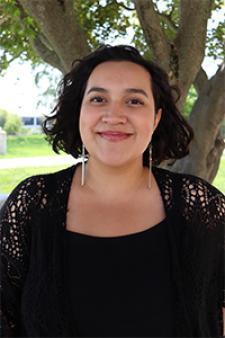

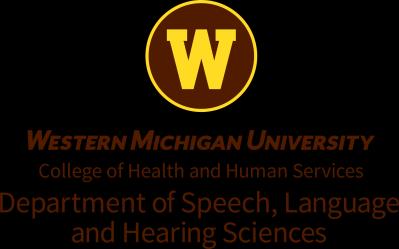
Western Michigan University's Celebration of Excellence is a celebration to honor our multicultural graduates. Celebrations are held twice a year, typically the Saturday before fall and spring commencements.
In 2023 -24, WMU faculty, staff and administration joined 181 graduates, and their supports to celebrate their accomplishment. Graduates received a Multicultural Graduate Certificate and a stole of their choosing that represents their cultural heritage they identify with.

The Multicultural Center at Western Michigan University provides the University student population with spaces for study, meetings, projects, and conversation. All events must have some educational value to the WMU community.
During the 2023 – 2024 academic year events and programs provided information on diversity, ethnic, and cultural issues through speakers, events, exhibits, and displays scheduled by University groups and organizations. Events were held by registered student organizations and a range of departments on campus such as Diversity Education, Seita Scholars Program, Outspoken, and Study Abroad.
The Multicultural Center is located in the Trimpe Building on WMU's main Kalamazoo campus.
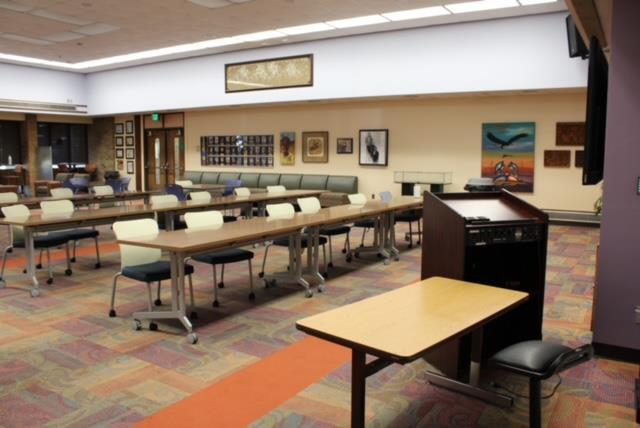
62
Total events held in 2023-2024
1357
Total guests in 2023-2024
Reserve the Multicultural Center here: https://wmich.edu/diversity /center

The Office of Diversity Education works to promote and enhance diversity, inclusion, and equity among faculty, staff, and students on campus. Diversity Education is also committed to efforts that support social justice, racial healing, and creating a positive campus climate.
The purpose of the four-part , interactive workshops is to engage participants in dynamic and experiential learning discussions and activities that foster a deeper understanding and commitment to DEI principles.
This introductory workshop is designed to introduce the conversation of racial disparity through the lens of identity, power, and privilege.
This intermediary workshop is intended to assist participants with understanding and minimizing the role of unconscious bias within their organization.
Microaggressions
This advanced workshop is designed to assist participants with the ability to recognize and alleviate microaggressions, personally and professionally.
This intermediary workshop is intended to assist participants with understanding and minimizing the role of unconscious bias within their organization.
The Office of Diversity Education plans to offer a Phase II DEI training series. Participants must have completed all of the Phase I series prior to enrollment.
16
DEI workshops offered 337
Total workshop participants
The Office of Diversity Education offers a variety of cultural programs and events designed to foster open dialogue, educate participants, and highlight diverse voices.
Real Talk Diversity Series, participants interact and learn about the experiences and perspectives of individuals and groups from many identities and backgrounds. Each Real Talk event includes discussion of the intersection of multiple identities. The series provides a forum to engage in and discuss critically many important issues, serving as a bridge to the entire campus community.
The Real Talk Diversity Series serves as a catalyst to promote, celebrate, and increase awareness about diversity at WMU, to recognize cultural differences as well as similarities, and to encourage cross-cultural interaction. These goals are accomplished through a number of different program formats including awareness raising programs, dialogue, and eliminating false ideologies.
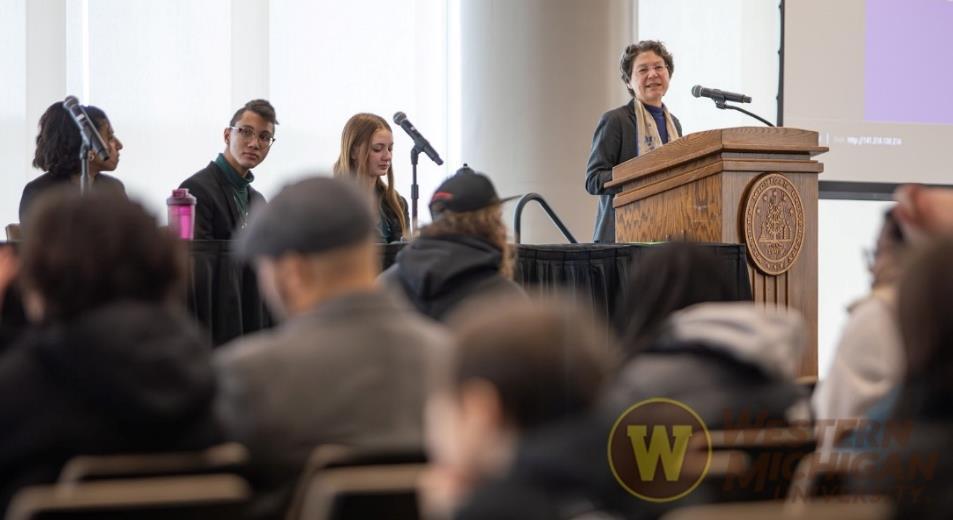

Carolyn Clifford, Journalist/News Anchor WXYZ-TV 7 Action News, Detroit, MI
Topic: “Honoring Herstory: Domestic Violence Awareness During Women’s History Month.”
John H. McCants, Jr., Actor/Playwright/ Minister
Topic: “Moments with Martin (MLK).”
Ovidilio Vasquez, Social Entrepreneur, Keynote SpeakerOvinspires
Topic: “Ovinspires: Educating and Inspiring Students to Graduate.”

Disability Services for Students at Western Michigan University strives to make education accessible and remove barriers to student success.
Disability Services for Students strives to strengthen full, diverse campus participation including those with disabilities. We will guide advocacy for universal design of facilities, programs, and activities. The office will promote inclusion, acceptance, respect, and empowerment.
Disability Services for Students (DSS) serves the university with the goal of providing services for students with disabilities with the intention of retaining students, recruiting new students, providing current students support, and emphasizing student success. DSS serves as a mechanism for students to request reasonable accommodations across campus to increase the equitable access of education.
During the Fall 2023 semester DSS had 1,468 students registered with the office, with 103 of those students completing their degree. During the Spring 2024 semester, DSS had 1,339 students registered, with 182 of those students completing their degree.
DSS survey responses:
What do you find most beneficial about being registered with Disability Services for Students?
“Feeling heard, understood, and supported to be my best academic self.”
“I find I don't have to work twice as hard as the average person to do the same task; I can be myself and take care of my needs without worrying about being looked down on or judged by my professors.”
1,151 Individual meetings with students 13%
Increase in registered students compared to AY23
Students who have met the academic eligibility requirements and are admitted to WMU, provide documentation, such as medical records, psychoeducational testing and school records and meet with a coordinator at DSS.
DSS includes the student in the process by doing an interactive process. We meet with the students and review their documentation and have conversations around their unique needs. During the meeting with the DSS coordinator, barriers and strategies, including reasonable accommodations and adjustments, are discussed to determine the requirements for providing access to learning for the student.
Most Requested Accommodations for Fall 23 and Spring 24
ATTENDANCE ACCOMMODATION
INDIVIDUAL
AUDIO
1/2
Comparison of Test Requests vs Tests Taken for Fall 23 and Spring 24
Glean – A personalized note taking and study tool available to DSS students at no cost
AIRA – A live, humanto-human professional assistance service for people who are blind or have low vision, also free of cost to anyone on WMU campus –which aids in recruitment.*
DSS provided test proctoring services for the 2023-2024 academic year. The purpose of test proctoring is to aid WMU faculty and staff in providing students testing accommodations. DSS sees test proctoring as a program that services as a student retention* tool.
These services are beyond the reasonable accommodations provided by the Americans with Disabilities Act Amendment Act and include weekly one-onone meetings with the ASC coordinator or graduate assistant; workshops and informational sessions; organized social events; and increased communication between students and professors, staff and parents.
While ASC and DSS operate independently, our collaboration is vital in providing comprehensive support for student retention* and persistence*.
The mission of the state agency Bureau of Services for Blind Persons is to provide opportunities to individuals who are blind or visually impaired to achieve employment, and/or achieve maximum and meaningful independence in life through comprehensive rehabilitative services.
DSS staff will collaborate with BSBP counselors and staff to provide support for students sponsored by BSBP. This partnership entails addressing accommodation and technology needs, as well as supporting BSBP's College Prep program for high school or recently graduated high school students residing on campus and enrolled in a class during Western`s Summer II semester.
Disability Services for Students collaborates with student support programs across campus. Each program is different and provides varying levels of programming focused on establishing and building skills needed for student support.
Mentoring Services:
• Peer2Peer
• Mentoring for Success
• TRIO Student Success Program
• Peer Academic Success Coaching
• TRIO Future Educator Success Program
Tutoring Services:
• Writing Center
• Math Tutor Lab
• Bronco Study Zone
• Statistics Tutor Lab
• Physics Help Room
• Supplemental Instruction
Learn more about Disability Services for Students here: https://wmich.edu/disabilityservices

The Office of Lesbian, Bisexual, Gay and Transgender (LBGT) Student Services is to ensure equitable access for all at Western Michigan University and promote a campus climate that affirms and supports the academic and personal development of all students inclusive of their sexual orientation, gender identity, and gender expression.
The Office of LBGT Student Services offers support, education and advocacy around issues of gender identity/expression and sexual orientation to the WMU community.
Since 1989, the WMU Office of LBGT Student Services has supported lesbian, gay, bisexual, transgender, queer, and questioning (LGBTQ+) students. Through diverse workshop learning options, engaging programs, social support, and advocacy, the Office of LBGT Student Services strives for inclusion, safety, and acceptance throughout the WMU campus.
The Office of LBGT Student Services is able to provide a sense of belonging for LGBTQ student through both direct and indirect services, events, and spaces. Examples of direct student engagement include facilitation of biweekly discussion groups, co-hosting events in different spaces (e.g. Friendsgiving Dinner at Spectrum House), and providing a student lounge space for students to study and connect with other LGBTQ students.
Indirect student engagement included training faculty, staff, and student leaders in how to become an LGBTQ ally through Safe on Campus training or facilitating a student panel for a class (e.g. First-Year Experience class). These experiences are considered “indirect” because a majority of participants do not identify as LGBTQ, but are individuals who contribute to the campus environment of inclusion.
The Office of LBGT Student Services has tabled at 18 orientation, open houses, and welcome events for the Office of Admissions. Additional opportunities for outreach will occur for orientations in May (3) and June (8) as well as off-campus outreach at Kalamazoo Pride.
Fall Fab Fest is hosted at the beginning of fall semester as an opportunity to welcome LGBTQ and questioning students while offering opportunities for students to connect with LGBTQ-friendly resources that are available on and off campus.
Lavender Graduation is hosted every spring to celebrate LGBTQ students who are graduating with their bachelor’s, master’s, or doctorate degrees.
LBGTSS engages in several programs that encourage student retention including:
• Safe on Campus certification training,
• SpeakOut student panels, and
• Bi-weekly discussion groups.
Additional retention opportunities include collaborative on-campus programs with Housing & Residence Life, FIRE Sexual Assault Peer Educators, and Multicultural Affairs for Students (MAS).
LBGTSS has hosted (or co-hosted) programs and events for our LGBTQ students to encourage community development, connecting students to resources, and to engage with the LBGTSS office.
LGBTQ students can explore their identities, engage in conversations, and build community by participating in bi-weekly discussion groups or becoming a SpeakOut panelist. Student panelists provide visibility of LGBTQ identities, awareness of current issues, and opportunities for student leadership development.
19
Average number of participants per program.
60 Programs hosted or co-hosted by LBGTSS.
15
Number of times an LBGTSS representative to speak or facilitate a presentation.
1,129
Total participants for AY24.

Although LBGTSS does not track how many WMU students identify as LGBTQ, graduating LGBTQ students are welcome to participate in our annual Lavender Graduation ceremony. This spring, LBGTSS had 39 students (31 undergraduate, 8 graduate) registered for Lavender Graduation to receive a rainbow tassel and certificate.
All members of the WMU campus community (faculty, staff, and students) are welcome to attend a Safe on Campus workshop to learn how to be a better ally or advocate to the LGBTQ community. Upon completion, participants can receive a placard to signify that they are an LGBTQ-welcoming person who is aware of the available resources on campus.
Safe on Campus encourages participants to display their placard, practice inclusion across campus, and to learn about the available resources.
• Participants will learn about LGBTQ-friendly resources that are available on and off campus.
• Participants will practice how to respond to common on-campus scenarios that affect LGBTQ students.
• Participants will reflect on the interplay of privilege and/or marginalization and how it impacts LGBTQidentity development.
Learn more about LBGT Student Services here: https://wmich.edu/lbgt
83.9% LGBTQ students who graduated with a 3.0 GPA or higher (undergraduate).
63 People have completed Safe on Campus Training (AY24).
Mission
To engage students in discovery and learning experiences in an effort to facilitate academic success and participation in a multicultural world.
Vision
To become a leading multicultural affairs department in supporting students and all members of the community in their holistic development.

Programs
• College Assistance Migrant Program (CAMP)
• Community Mentoring Program
• Kalamazoo Promise
• Martin Luther King, Jr. Scholars Academy
• Mentoring for Success Program
• Navigator Network

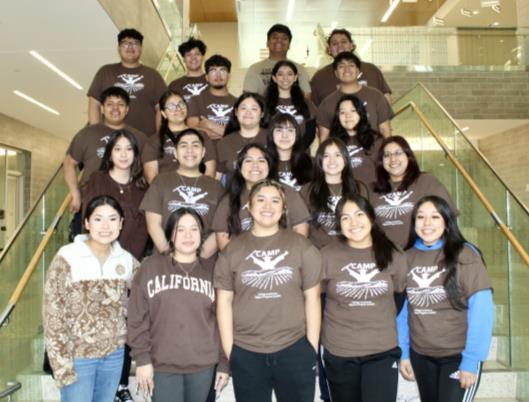
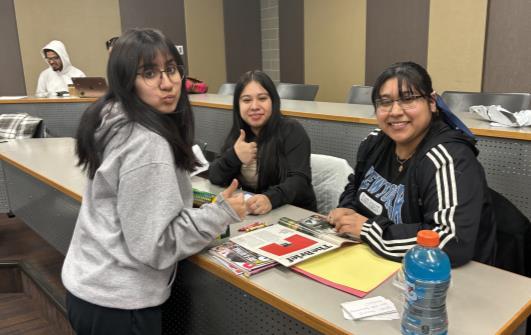
The College Assistance Migrant Program (CAMP) is a nationwide grant program that assists students who are migratory or seasonal farmworkers enrolled in their first year of undergraduate studies. It is federally funded by the U.S. Department of Education's Office of Migrant Education (OME). The Western Michigan University (WMU) College Assistance Migrant Program (CAMP) is a program funded by Western Michigan University, since fall 2022 and was previously funded by OME from 20122022.
The program’s goal is to provide supportive services to migrant and seasonal farmworkers or their dependents, and to assist them in the successful completion of their first year of college and persistence toward degree attainment. The program provides services and resources in the areas of academic guidance, career planning and development, intellectual and cultural enrichment, as well as financial assistance based on individual need. Program participants also receive follow-up supportive services after their first year.
2.91
Average cumulative GPA for spring 2024
"CAMP has best supported me this year emotionally. They truly did give me a familia here on campus and with that it gave me this sense of comfort that was truly needed during my time here.“- WMU Student
CAMP students would like to continue with the program after their first year
18 & 16
Workshops and events were held during the year 81%
46% Of students increased their GPA from fall to spring
"I strongly believe that CAMP best supported me this year by teaching me everything about WMU. How to explore degree works, how to calculate my GPA, how to navigate around campus. Most importantly they made me feel at home and be comfortable while transitioning into this new chapter of my life. So, I feel like this CAMP program really paved the way for me.“WMU Student
This academic year, WMU CAMP served 30 new first year students. There were 19 CAMP students graduate with their Bachelor's degree and 2 students graduate with their Master’s. WMU CAMP continued campus partnerships which resulted in two new scholarships for CAMP students: the Lee Honors College and the College of Engineering and Applied Sciences are offering scholarships for students who complete their first year.
Despite limited recruitment funds and a recruiter not being hired until spring semester, CAMP staff was still dedicated to outreach and recruitment and visited 11 schools throughout the year, in addition to collaborating with the Office of Admissions for additional on campus recruitment programs. CAMP staff is also trusted by families who are from mixed statuses and have a student needing to complete the FAFSA. CAMP staff helped over 20 non-WMU students complete FAFSA.

"My leader helped me with reaching my academic goals because she always made me feel more put together, than I actually was. she still made me know what it felt like to be treated with kindness and respect. My academic goals were reached at the best of my ability because Jacky never doubted my work ethic, which led me to succeed even more."
"My leader helped me as a mentor and as a friend encouraging me to find the balance between social life and academics. They were always a welcoming face and someone I know I can go to her beyond my time as a CAMP scholar."
11
Schools visited by CAMP staff for outreach and recruitment
96%
Of students found their peer leader helpful
100% Of students agree that their CAMP leader helped them be a better student
The Community Mentoring Program is a mentorship-based initiative that strives to help African American male students make a successful transition between college and their professional careers. This program aims to provide students who are juniors and seniors at WMU with opportunities to connect with career professionals from the Kalamazoo community in a safe, welcoming and supportive mentorship program. The program also strives to help African American male students make a successful transition between college and their professional careers.
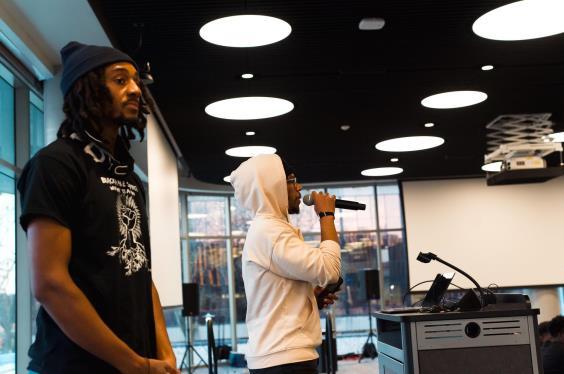
The program took a transition from focusing efforts entirely on individual mentoring to implement more opportunities for group mentoring. Through the new format, we were able to host/co-host 7 events for 23-24 academic year.
A group of WMU students of various majors and class positions hand wrote letters for a collection of Black male students at Phoenix high school in Kalamazoo.
The program collaborated to bring speakers to educate and connect with them who attended events hosted on campus: Dr. Umar Johnson and David Banner.
Connecting students with one another to build an executive board for Young Black Male Support Network.

“This was great engagement and dialogue! I would encourage somehow more back and forth discussions between speakers and students. Overall, the event was great!" - WMU Student

The Kalamazoo Promise Scholars Program seeks to serve all current and prospective Promise-eligible Western Michigan University students by addressing concerns in the areas of education, finances and employment, housing, mental and physical health, cultural identity formation, supportive relationships and community connections, as well as life skills for college and career success. Additionally, we answer questions regarding their scholarships, support their transition to WMU from high school or their previous home institution, and offer mentorship about navigating the unique college environment at WMU.
The new Kalamazoo Promise grant provides academic and engagement resources to support Kalamazoo Promise students. Students benefit from this program by having academic and financial wellbeing planning, opportunities to participate in the registered student organization, leadership opportunities and more.
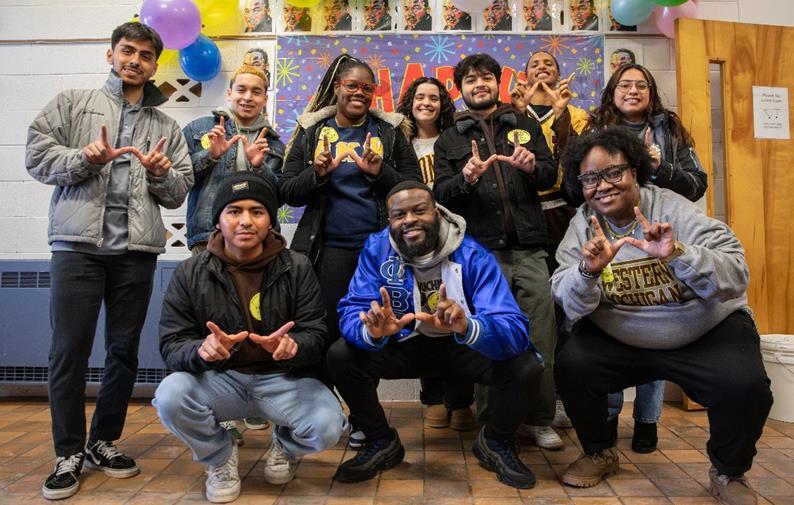
Of incoming Kalamazoo Promise students met with a success coach
Hours of academic coaching 80%
Average Kalamazoo Promise GPA for spring 2024 70+
3.08
87
Kalamazoo Promise students graduated this academic year 77.6%
Of students were retained –the highest since 2016
In the second year of the grant cycle, the Kalamazoo Promise Program grew leaps and bounds. Our focuses for the academic year were student accountability with various elements of the grant, community outreach, and engagement.
This year, 80% of the incoming class was able to meet with a caring professional on campus to create an academic success plan. We are grateful in the partnership of WMU special programs like CAMP, Seita Scholars, and TRIO in addition to the Multicultural Navigation Specialists for helping us to reach this goal.
Focus groups completed in the pilot year of the grant have led to the establishment of the Kalamazoo Promise Scholars at WMU registered student organization. Advised by Faculty Lead Dr. Mark Orbe, the RSO has assisted in increased engagement. The RSO provides volunteer and social opportunities monthly.
As our partnership with Kalamazoo Public Schools and the Kalamazoo Promise increases, so do the opportunities for increased interaction and engagement with K-12 students. Through our inaugural "Kalamazoo Promise Roadshow" event, WMU student volunteers from various RSOs presented to 400 KPS juniors and seniors about going to college.
“... I received way more out of this program! I have gained friends and family members. I have gained motivation and light at the end of the tunnel. I now have confidence that I will graduate! and it may not be in the time frame that I would like however I am running a marathon not a race. I have learned patience and I’m so grateful for everyone assisting in this program.”WMU Student
"Great environment, great students and, facilitators.“WMU Student
“Being able to strip away the inhibitions and fears of personal sharing from the group, being able to create an environment of openness, empathy and connection.”WMU Student
The MLK Academy’s mission is to engage students in discovery and learning experiences to facilitate academic success, engagement, and participation in a multicultural world.
The four-tiered Academy is designed to support students through their academic journey at WMU. Each program level provides academic course review, academic coaching, free tutoring, campus life and socialization. Additionally, diverse, cultural, and wellness education programs, are infused into the framework of the program.
The MLK Academy, was established in 1968, after the assassination of Dr. Martin Luther King, Jr. The program has served thousands of students since its inception and continues to offer comprehensive support to participants of the program.
Initially, the program was funded through a grant from the Kellogg Foundation and was able to provide scholarships as well as remedial help to its participants. “Project 73” the original name of the program, began as a six-week summer bridge program in 1968 with sixty WMU freshmen coming from high schools throughout southwestern Michigan.

Pre-Nursing, 2nd year Detroit, MI 86% Retention rate 3.0 Cumulative GPA (all tiers)

“The MLK Program has helped me through tremendously. Being a first-generation, Black entering a predominately White college was overwhelming for me. The MLK Academy changed everything for me.
The Academy exposed me to supportive activities, like mentoring, multicultural events, and academic programs, that helped me get through my first year at WMU.
I want to thank all of the mentors and staff involved in the MLK Program for believing in us, helping us connect with more multicultural people, and providing the tools to achieve the goals we have set for our future."
47%
Graduated within four years (2020 cohort)
33% Made the Dean’s List
88%
Eligible to return to the academy
The Mentoring for Success Program is a peer mentoring program designed to promote program participants' success at Western Michigan University through increased acceptance rates into participants' intended majors and increased college graduation rates. The program is geared toward achieving specific academic and developmental goals that are focused on participants' overall development.
The program is optimized for and most beneficial to first-year and second-year students. The Mentoring for Success Program is funded by the State of Michigan's Department of Labor and Economic Opportunity's King-Chávez-Parks Initiative, as well as WMU's Multicultural Affairs for Students and Office of Diversity of Inclusion.
We provide all eligible program participants with a convenient 24/7 online tutoring service that empowers students with on-demand access to oneon-one support anytime, anywhere and quickly connects learners with a vast community of verified tutors covering over hundreds of subjects. Each student who receives tutoring will automatically be assigned to an academic mentor, who will serve as a knowledgeable and experienced guide and resource.
"I thought having additional mentoring was really great! I was able to have more options to look at as a student. I would for sure recommend this to other students!“ - Flor Romero, first-year, nursing
“She was an amazing mentor who, when I would see her at a campus event, would come say hi to me and see how I was doing. To see my mentor care for me outside of our meeting times really meant a lot to me! She was always a great encourager and listening ear when I needed to vent which I really appreciated!” - Jazmin Moron, sophomore, political science: public law

2023-24 Fast Facts (excluding summer sessions)
Race:
• Asian: 5.39% (13/241)
• Black or African American: 17.84% (43/241)
• Hispanic or Latino: 49.38% (119/241)
• White: 15.35% (37/241)
• Multiracial: 10.37% (25/241)
• International (guests): 1.66% (4/241)
Gender:
• Female: 63.07% (152/241)
• Male: 35.27% (85/241)
• Nonbinary: 1.66% (4/241)
Numbers and Percentages for Goals:
• 94.04% of participants completed the academic year in good standing.
• 97.71% of participants declared a major by the end of their sophomore year.
• 100% of participants graduated within six years of enrollment to the university.
Service Usage:
• Workshops: 7
• Study sessions: 2
• Speaker event: 1
• High school tutoring sessions (GEAR UP): 29

“As a mentor, I’ve found this experience incredibly rewarding. Working with students, guiding them through challenges, and witnessing their growth throughout the semester is what makes this job fulfilling. The mentorship program not only gives support but also fosters a sense of community and lifelong learning to everyone.” – Amy Nobouphasavanh, academic mentor, 2023-current
187 Tutoring hours
59 Mentorship hours
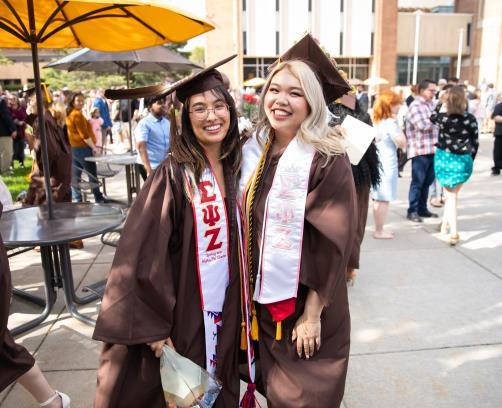
The Navigator Network is a team of professionals and fellow students that provide individualized support to meet the students' academic and well-being needs.
Navigators are focused on supporting students from the moment their education begins. Whether they need a simple referral or a higher level of support, the Navigator Network is invested in student progress and cares deeply about their success.
The Navigator Network works directly with the student to remove barriers and find solutions, no matter what challenges they may face, including:
• Academics
• Well-being and mental health
• Making connections in the campus community
• Financial well-being and literacy
1. Increase the number of individual coaching sessions provided by MAS Navigation Specialists by 20% compared to the previous academic year.
2. Develop and execute a multi-faceted marketing and outreach campaign to raise awareness and increase visibility of the MAS Navigation Specialists and their services.
3. Establish collaborative initiatives with at least 6 campus stakeholders (e.g., academic departments, student organizations, residence life) to integrate the MAS Navigation Specialists into existing student support networks.
4. Host 6 events per semester focused on cultural awareness, belonging and community.
Asset-based coaching and connections to student groups.
Individualized support for first-gen, Pell-eligible and various identity groups.
Develop skills for professional and personal success.
Proactive support for students' academic and well-being needs
Fast Facts
29 Programs/events
50+ RSO program support hours
2023-2024 was a foundational year for the Navigation Specialists in Multicultural Affairs. During this period, the Navigation Specialists hosted several events centered on cultural, professional, personal, and academic success.
They also focused on providing proactive one-to-one support for each student who reached out, was referred, or was reached out to by the Navigation Specialists. As a collective, the Multicultural Affairs Navigation Specialists team held 29 events. The demographics reached spanned the entire campus community, from international students to BIPOC and White students.
The Navigation Specialists were able to collaborate with numerous departments and individuals across campus, thus increasing the reach and awareness of their roles. They focused on building intentional relationships with individuals and departments on campus that were focused on student success.
“I appreciated having a safe space for students to be able to express their concerns and empower one another.”
"My favorite aspect about the event was being able to share laughs with people I wouldn’t typically be with. Being able to experience and learn facts about various cultures, allowed me to expand my knowledge of the world around me."

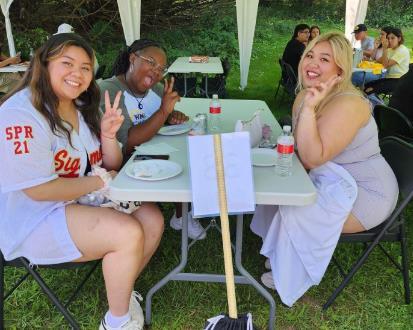



As evidenced in this report, the Office of Diversity and Inclusion has made a significant impact on Western Michigan’s campus community by engaging over 2,900 faculty, staff, and students in approximately 170 inclusive programs, workshops, and trainings for the 23-24 academic year. This work included 544 direct student support service hours in the form of academic tutoring and coaching, registered student organization support, and mentorship. With an average retention rate of 81.5% across our special programs, ODI remains focused on implementing programs and strategic initiatives to drive the university closer to our overall retention goal of 84% university-wide.
Additionally, the Office of Diversity and Inclusion would like to thank our institutional and community partners who have collaborated in this important work. We will continue to engage our entire campus community in cultivating an inclusive and productive learning environment that embraces our differences and ensures WMU is a place where all feel seen, heard, and valued.
Our Diversity is our Strength…
